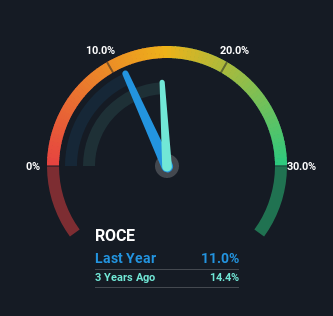- India
- /
- Aerospace & Defense
- /
- NSEI:APOLLO
Apollo Micro Systems (NSE:APOLLO) Is Reinvesting At Lower Rates Of Return
What trends should we look for it we want to identify stocks that can multiply in value over the long term? One common approach is to try and find a company with returns on capital employed (ROCE) that are increasing, in conjunction with a growing amount of capital employed. This shows us that it's a compounding machine, able to continually reinvest its earnings back into the business and generate higher returns. However, after investigating Apollo Micro Systems (NSE:APOLLO), we don't think it's current trends fit the mold of a multi-bagger.
Return On Capital Employed (ROCE): What is it?
Just to clarify if you're unsure, ROCE is a metric for evaluating how much pre-tax income (in percentage terms) a company earns on the capital invested in its business. Analysts use this formula to calculate it for Apollo Micro Systems:
Return on Capital Employed = Earnings Before Interest and Tax (EBIT) ÷ (Total Assets - Current Liabilities)
0.11 = ₹374m ÷ (₹6.0b - ₹2.6b) (Based on the trailing twelve months to March 2022).
So, Apollo Micro Systems has an ROCE of 11%. By itself that's a normal return on capital and it's in line with the industry's average returns of 11%.
View our latest analysis for Apollo Micro Systems

Historical performance is a great place to start when researching a stock so above you can see the gauge for Apollo Micro Systems' ROCE against it's prior returns. If you're interested in investigating Apollo Micro Systems' past further, check out this free graph of past earnings, revenue and cash flow.
What The Trend Of ROCE Can Tell Us
When we looked at the ROCE trend at Apollo Micro Systems, we didn't gain much confidence. Over the last five years, returns on capital have decreased to 11% from 43% five years ago. However, given capital employed and revenue have both increased it appears that the business is currently pursuing growth, at the consequence of short term returns. If these investments prove successful, this can bode very well for long term stock performance.
On a related note, Apollo Micro Systems has decreased its current liabilities to 43% of total assets. So we could link some of this to the decrease in ROCE. What's more, this can reduce some aspects of risk to the business because now the company's suppliers or short-term creditors are funding less of its operations. Some would claim this reduces the business' efficiency at generating ROCE since it is now funding more of the operations with its own money. Keep in mind 43% is still pretty high, so those risks are still somewhat prevalent.
The Bottom Line
In summary, despite lower returns in the short term, we're encouraged to see that Apollo Micro Systems is reinvesting for growth and has higher sales as a result. In light of this, the stock has only gained 4.1% over the last three years. Therefore we'd recommend looking further into this stock to confirm if it has the makings of a good investment.
One more thing: We've identified 2 warning signs with Apollo Micro Systems (at least 1 which is significant) , and understanding them would certainly be useful.
If you want to search for solid companies with great earnings, check out this free list of companies with good balance sheets and impressive returns on equity.
New: Manage All Your Stock Portfolios in One Place
We've created the ultimate portfolio companion for stock investors, and it's free.
• Connect an unlimited number of Portfolios and see your total in one currency
• Be alerted to new Warning Signs or Risks via email or mobile
• Track the Fair Value of your stocks
Have feedback on this article? Concerned about the content? Get in touch with us directly. Alternatively, email editorial-team (at) simplywallst.com.
This article by Simply Wall St is general in nature. We provide commentary based on historical data and analyst forecasts only using an unbiased methodology and our articles are not intended to be financial advice. It does not constitute a recommendation to buy or sell any stock, and does not take account of your objectives, or your financial situation. We aim to bring you long-term focused analysis driven by fundamental data. Note that our analysis may not factor in the latest price-sensitive company announcements or qualitative material. Simply Wall St has no position in any stocks mentioned.
About NSEI:APOLLO
Apollo Micro Systems
Designs, develops, and assembles electronic and electromechanical solutions in India.
High growth potential with solid track record.
Similar Companies
Market Insights
Community Narratives



